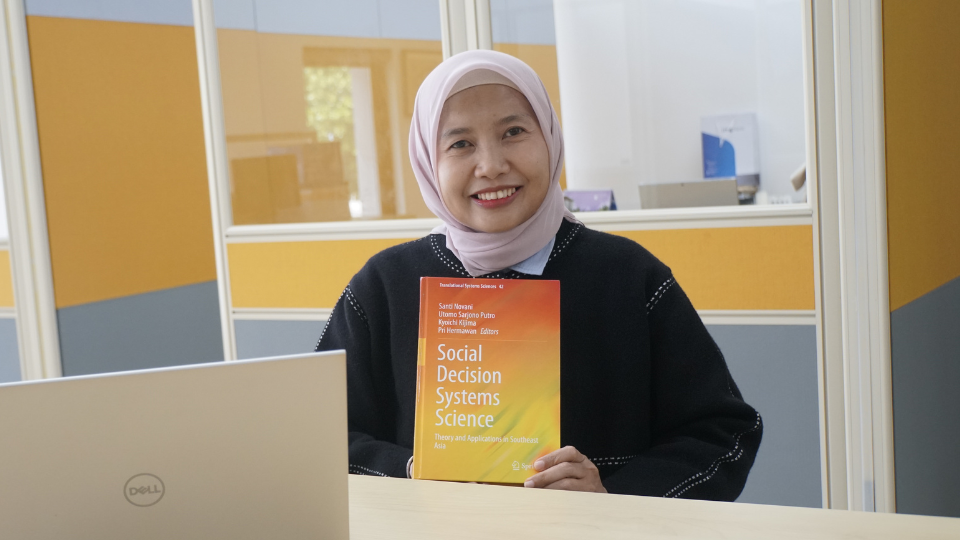Bandung – The socio-economic challenges in Indonesia and Southeast Asia, such as inequality in access to food, the dynamics of micro, small, and medium enterprises (MSMEs), and the development of sustainable tourism, are often complex and difficult to analyze using traditional approaches. In response to this challenge, a new book titled “Social Decision System Science: Theory and Application in Southeast Asia” (Springer, 2024) has been published. This book is edited by Santi Novani, Utomo Sarjono Putro, and Pri Hermawan from the School of Business Management at the Bandung Institute of Technology, along with Kyoichi Kijima from the Tokyo Institute of Technology. It integrates social systems theory with practical applications tailored to local contexts.
“We aim to emphasize systems approaches to wicked problems—issues that lack a single solution—in Southeast Asia,” said Santi Novani on April 23.
This book, dedicated to the late Prof. Kuntoro Mangkusubroto, a complex policy system expert and founder of SBM ITB, addresses a gap in the literature by focusing on the interactions of purposeful actors within social systems.
The Social Decision System Science book is systematically organized into three main parts that take readers from theoretical foundations to practical applications. The first part is Basic Concepts, which introduces the framework for decision-making in complex systems using the Cynefin Framework.
The framework classifies problems into four categories, simple, complicated, complex, and chaotic, to help readers understand the nature of the problems. This approach is complemented by three system metaphors, machine, organism, and social, emphasizing the importance of recognizing the existence of purposeful actors, individuals or organizations with different goals and interests, in a democratic social system like Indonesia.
The second part is Multidisciplinary Methodology, which explores the integration between hard and soft systems. Hard system approaches like System Dynamics are used for modeling the reality. Meanwhile, soft systems such as Drama Theory and Abductive Reasoning are applied to analyze conflict-ridden social interactions. The second chapter, written by Pri Hermawan and her team, is an interesting example by applying Abductive Drama Theory to analyze systemic pathologies in the peer-to-peer accommodation industry.
“This represents a significant advancement in mapping the dilemmas and systemic diseases that stem from social interactions,” explained Santi Novani.
The third section, Indonesian Case Studies, presents real-world applications of the theories and methodologies discussed. The chapter on Pangandaran tourism (Chapter 4) reveals how MSME network analysis identified fragmentation of innovation among business actors. This finding encourages recommendations to strengthen the role of facilitators who can promote collaboration.
Meanwhile, the chapter on food security (Chapter 5) uses System Dynamics simulations to test policy intervention scenarios to reduce malnutrition cases. The results show that a cross-sectoral approach, from agricultural technology to food distribution, is crucial. Another equally interesting chapter discusses the resilience of MSMEs during a crisis (Chapter 6), where the value co-creation strategy between the government, community sector, and business actors has been proven to increase business resilience.
“A successful value co-creation strategy hinges on deeply involving, curating and empowering stakeholders,” added Santi Novani.
The uniqueness of this book lies in its ability to bridge complex theories with the socio-economic realities of Southeast Asia, especially Indonesia. With a population of 280 million and high cultural diversity, Indonesia is an ideal laboratory for testing a systemic approach. This book not only offers in-depth analysis but also recommendations for real action.
This book’s hybrid hard-soft system approach allows readers, including academics, policy practitioners, and business actors, to see problems from various perspectives while designing collaborative and contextual solutions.
The book “Social Decision System Science” is available from Springer in print (€136) and digital formats. It is accessible to academics, policymakers, and professionals interested in understanding the complexity of social systems through an applied lens. With its strong theory, innovative methodology, and relevant cases, this book is a worthy academic reference and a practical guide for those seeking to navigate socio-economic challenges in an era of uncertainty.





